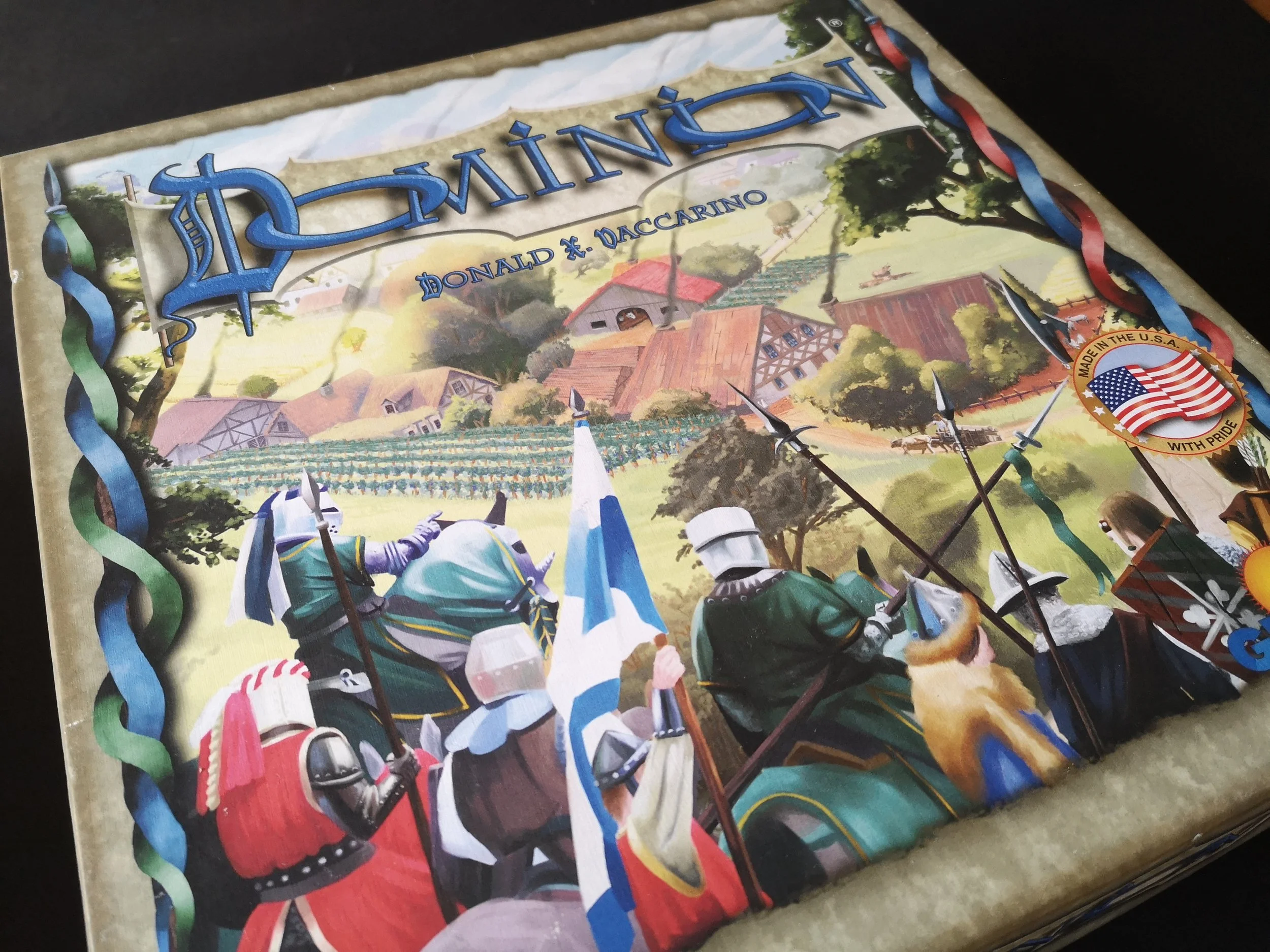Dominion - Review
Dominion is a game we previously saw in my top three games of 2022; today, I’ll be doing a more in-depth review. Dominion is a card game with a medieval theme, and, as such, many of the cards reference the social structures prevalent at the time, including feudalism and pre-industrial societies. In Dominion, you are playing as the monarch of a small kingdom, but you have greater ambitions than the lands you currently hold! Unfortunately, other monarchs have had the same idea, and you must race against them to create the greatest kingdom.
Dominion was the first deck-building game. In deck-building games players generally start with an identical, small set of cards, which they add to throughout the game. As the game progresses, the cards players can add to their deck will often be more powerful than their earlier cards, and can have a variety of abilities, such as hindering opponents, or allowing you to get rid of unwanted cards. Some games, like Dominion, use deck-building as a central mechanic, whilst other games, such as Arkham Horror: The Card Game, combine deck-building with other mechanics.
The first edition of Dominion.
Set-up: 8/10
Setting up the game is straightforward. First, each player is given seven coppers and three estates, which forms their starting deck. The players then set up the remaining Treasure, Victory and Curse cards. Eight of each Victory card are used for two players, twelve of each for three or four players. In a two-player game, ten Curse cards are used, with three players, twenty are used, and with four players, all thirty are used. Then ten piles of Kingdom cards are placed in the centre, either at random, or using a pre-generated list.
Mechanics: 8/10
Dominion is incredibly easy to learn. Players take it in turns to play cards from their hands. Each player starts with one action, and when they finish playing their action cards (if any), they play treasure cards from their hand. They may buy cards up to the amount of money they have generated this turn, from Treasure or Action cards. This sounds more complicated than it is; each card specifies on it what it does, so you don’t have to remember many rules. The game ends when the Province pile is empty, or three other supply piles are empty.
The base game keeps everything simple, but if you add certain expansions, they can provide extra rules and mechanics to learn. The hardest part of learning the game is working out which cards synergise well together; players who know the cards well can potentially play all of their cards in a turn, whilst those who don’t may end up having turns where they do very little.
Every game uses these basic cards for scoring and generating money.
Scoring: 8/10
For the most part, scoring is simple. At the end of the game, add up all the points scored from your Victory and Curse cards. Most victory cards are integer values: Estates are worth one point, Duchies three points, and Provinces six points. Where this can grow convoluted is with cards such as Gardens (from the base game) or Vineyard (from Alchemy), as the points of these cards change based on your deck. Overall, scoring isn’t difficult, and the Victory cards are easily identifiable, being green.
Replayability: 9/10
Dominion offers a great amount of replayability. The base game alone comes with a large variety of kingdom cards, offering you countless combinations of cards. Changing one card changes how the others interact within a game. Even without this change, you can play multiple games using the same cards, and each game will still be different! With a host of expansions (I think it’s 15 at time of writing), this offers even greater versatility and options for games. Dominion is one of those games we keep coming back to.
Dominion Intrigue is a good place to start if you’re looking at expanding your game.
Speed: 6/10
The speed of Dominion can vary greatly, simply based on what Kingdom cards you’re playing with.
If players are unable to gain the more powerful cards (those that cost five or more), the game may play out a lot more slowly than if players are able to get those cards within their first few turns. Likewise, if players are able to play through their entire deck in a turn, this can slow the game down, as each turn takes a while to play out, whilst players that do one (or no) action on their turn will play quickly. If ways of getting rid of unwanted cards are limited, or lots of attacks are in play, then the game may also take longer to play out. Ideally, a game of Dominion will take around 30 minutes, but this will vary from game to game.
Final Thoughts:
Overall, I love Dominion. It has incredibly simple mechanics that anyone can learn, making it easy to introduce to new players, while offering great in-depth strategy at the same time. Players have multiple options for how they play each game, and with different Kingdom Cards, each game will be different! Dominion works well for two, three, or four players, and the number of players can also affect how valuable some cards are, providing even greater replayability. I would recommend picking up a copy of Dominion.
I hope you found this review helpful! If you want to see more from me, you can become a member or a Patron, and gain access to extra content !
Keep up to date and follow me on Facebook, Twitter, Instagram, YouTube, or Reddit.
Happy Gaming!
Chris


